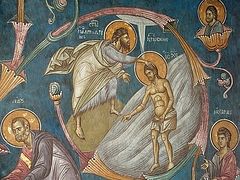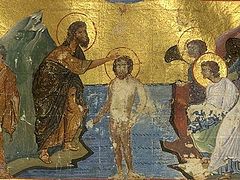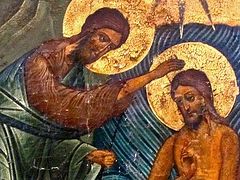In the Name of the Father, and of the Son, and of the Holy Spirit.
Today is the great feast of Theophany. We remember the Baptism of the Savior in the waters of the Jordan and the revelation of the Holy Trinity—that is why the feast is called Theophany [God made manifest].
But there is one more reason why we call this feast Theophany—because in Jesus Christ Who was born in Bethlehem we have a special personal manifestation of God. The Apostle Paul said excellent words about this, helping us understand the meaning of the incarnation of the Son of God: For in Him dwelleth all the fulness of the Godhead bodily (Col. 2:9).
God Who is beyond our comprehension is the Creator of the universe. A glance at the stars in the sky is enough for your mind to be literally thunderstruck with the splendor of creation. Wherever we fix our gaze, whether it be the sky or the earth, a blade of grass or a human being, there is God’s boundless and incomprehensible wisdom everywhere.
Human beings have always wanted to know Who God is, they have always striven to get to know Him Who created the world and mankind. That is why almost the entire history of our world is the history of the quest for God. We are aware that in antiquity people in their attempts to imagine a great God Who created the world would indulge in fantasies, making themselves idols, sometimes magnificent and giant ones, of gold and silver. People felt they must create something meaningful and beautiful in order to represent their understanding of God in some way. We know that all of this was vain, fruitless, false, and even sinful.
God would appear in a particular way in the history of humankind. He spoke with Adam; He was close to the first people and did not abandon man and His creation without His providence. We are aware that He appeared to Abraham in the form of three strangers in a particular way. God appeared to Jacob by wrestling with him, thus showing him His power. The Almighty appeared to Moses in the form of the Burning Bush. But all these appearances in antiquity only partly helped man to understand what God is like. In Jesus Christ, His incarnate Son, the Creator reveals the fullness of His Divine nature to enable people to get to know God as far as their human nature allows.
And today we cannot claim that we do not know God. True, our knowledge of Him is infinitesimal and extremely insufficient in contrast with the infinite power of God. But nonetheless this knowledge enables us to do something very important in our lives because the Son of God came into this world and spoke to us; which means that we can assert that we know God’s thoughts—at least His thoughts about man. Likewise, we know the will of God, for the Word of God reveals His will to us through His commandments and laws. And we are aware that the will of God is only disposed to goodness—it is goodness itself.
But through the incarnation of the Son of God something else, something special is revealed to us—something incomprehensible yet real. Through the incarnation we get to know the might of God, the Divine energy which we call grace. It was the will of God that through the incarnation of His Son man might not only perceive God with his mind, heart and will, but can also be united with God and participate in Divine power. It is today that we in a particular way celebrate this Divine power, Divine grace that was given by God in Christ to the entire human race. Through the feat of the Savior, through His death and Resurrection, through His condescension to humanity with all its sins, vices and suffering, Divine grace has been granted to us as God’s great gift. This is the power that is capable of overcoming all the sinful dispositions of our souls, all evil acts, all our imperfections and illnesses, whether mental or physical.
Why are we especially celebrating this gift of God on this particular day? Because, by a very ancient tradition that goes back to the first years of the life of the Church of God, the waters are blessed by the invocation of the Holy Trinity and of the Lord. And the water fills with Divine power and energy without changing its nature; and this wonderful act communicates to us the certainty of the fact that God by His grace can stay with all of us, with the whole of His creation.
In the early Church, catechumens were always baptized on the feast of Theophany, as it was on the feasts of the Nativity of Christ and on Pascha. Catechumens were those who prepared themselves for Baptism, who would listen to the special instructions of a bishop or priest, who would get ready for the great sacrament both mentally and spiritually. That is why the services of the feasts of Pascha, the Nativity of the Lord and Theophany mention the Baptism of catechumens that would take place on those days. We sing the wondrous hymn: “As many have been baptized into Christ, have put on Christ”—the same hymn is sung during the sacrament of Baptism too.
These are marvelous words: For as many of you as have been baptized into Christ have put on Christ (Gal. 3:27). On the one hand, it is a prayer and a great petition to God so that each baptized person would be given the strength to “put on Christ”—that is, to accept the things we have been taught; accept God’s thoughts of us, His will, His energy, His power, His grace. We implore the Lord; but, on the other hand, these words also express an assertion: as many have been baptized into Christ, have put on Christ. These words sound both as a call to all of us, baptized people, and a reproach to us all, because each can ask himself: “I was baptized—in childhood with my parents’ involvement or at a conscious age of my own will—but have I put on Christ? Have I accepted His thoughts, His will, His feelings? Do I open my heart to receive His grace?”
It is a great day today. It reminds us all of the mystery of our own Baptism, calling on each of us to accept this sacrament not as a custom (or a “rite”, as some ignorant people say) but as the great mystery of our salvation and to put on Christ with Baptism. This does not happen instantly: you cannot put on Christ immediately after leaving the Baptismal waters. Putting on Christ and the salvific robes is the path of all your lives; it is always accompanied by struggle and much strain, because putting on Christ requires overcoming numerous temptations and traps—all the things that often separate man from God. It is a sort of a task for a whole human life, and each of us should repeat these wondrous words incessantly until his last breath: “I have been baptized into Christ, and I am putting on Christ.”
Then our faith will be living and effective. Then people will do good not at a command, not at a direction, but following the dictates of their hearts, because it is impossible to do good at a command—in this case doing good is reduced to the performance of a duty. We can live a full Christian life only when we do what the Lord taught us naturally, without pressure, according to the dictates and desire of our hearts.
Let the feast of Theophany renew our strength to keep our fidelity to the Savior with Whom we have united, Whom we have accepted into our hearts through the sacrament of Baptism, and to Whom we must be faithful to the end of our lives. Amen.
December 19, 2010, the feast of the Baptism of our Lord, God and Savior Jesus Christ, at the Theophany Cathedral Church in Elokhovo, Moscow.




